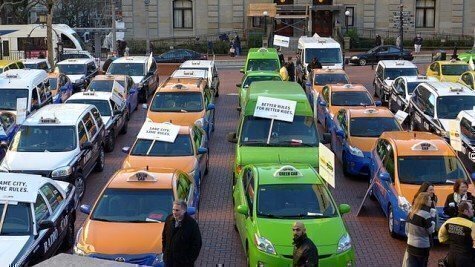Uber, the popular and controversial ride-sharing service, is on the offense and the defense in two big legal battles that could shape its future.

The upstart company is taking on local governments and taxi companies in disputes across the country over its right to facilitate rides for customers in a non-traditional manner. In the pre-Uber days, local governments licensed the taxi industry. Uber breaks that model by conducting ride-sharing arrangements using mobile apps that let drivers communicate with customers.
In Philadelphia, for example, the Philadelphia Parking Authority, of “Parking Wars” TV fame is in a court battle with Uber over its lack of licensing in Philadelphia. The city’s taxi companies also sued Uber last December, comparing the ride-sharing service to bootleggers from the 1920s.
But two recent national legal cases involving Uber could have far-reaching effects that could guarantee, or severely hurt, the company’s business model.
In a United States District Court based in Saint Louis, Uber is citing a February 2015 U.S. Supreme Court ruling about the dental industry, claiming that market participants like taxi companies can’t participate in certain state-licensing boards that regulate an industry.
The case, North Carolina State Board of Dental Examiners v. Federal Trade Commission, involved the eligibility of a state-licensing dental board to be sued over anti-competitive practices, if the board wasn’t actively supervised by state officials. Uber claims a similar situation exists with the agency that regulates cabs in Saint Louis.
However, the company is also involved in a separate legal action about the compensation of Uber drivers. On September 1, a federal judge in Northern California determined that 160,000 current and former Uber drivers could take part in a class-action lawsuit against Uber. The drivers want to be classified as employees and not as independent contractors. As employees, the drivers could qualify for benefits like health insurance and they would get to keep tips.
Uber has argued that its drivers are a diverse group and the company has many types of contracts for drivers, so a single class of driver doesn’t exist. Northern District Court Judge Edward Chen didn’t agree with that argument.
In its appeal to the Ninth Circuit, Uber claims that the case is about “the unique context of the sharing economy. In particular, it is the leading case raising urgent questions about the classification of sharing-economy workers.”
Uber also argues that requiring benefits compensation would yield “potentially staggering consequences” that would kill the shared-economy business model.
Shannon Liss-Riordan, the lead attorney representing the Uber drivers, said in a statement after the California ruling that her firm was hopeful the case would lead to Uber drivers around the country receiving compensation.
“If we are successful for California drivers, we intend to appeal the ruling that limited the case to California and will seek reimbursement for expenses, as well as tips that were not distributed to Uber drivers, around the country,” Liss-Riordan said.
That outcome could take some time in the legal system as the appeals process plays out.







